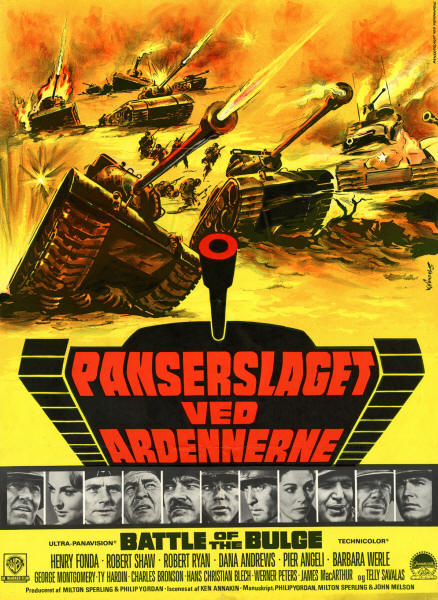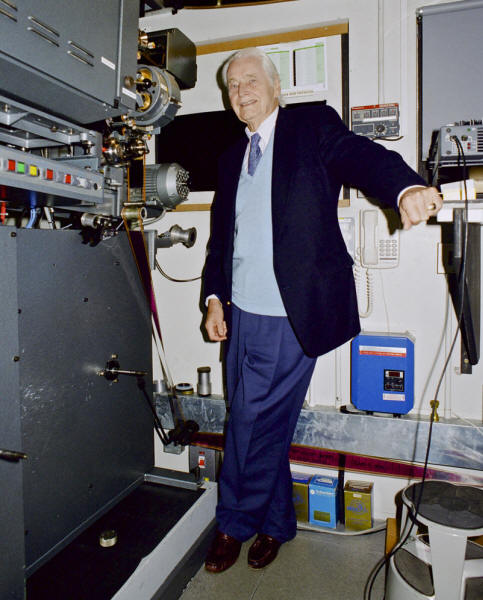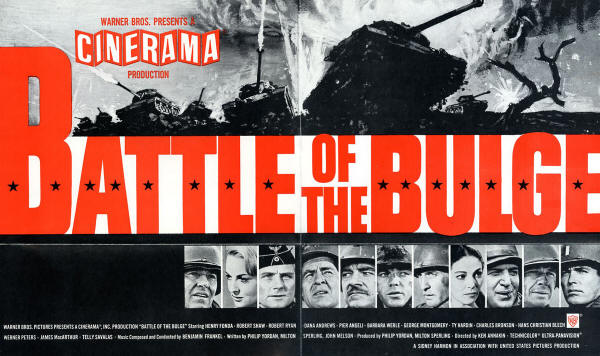Warner Bros. Presents A
CINERAMA
Production
BATTLE OF THE BULGE |
Read more at in70mm.com The 70mm Newsletter |
| Written by: Contemporary Warner Bros. Press about the production, 1965. | Date: 17.04.2022 |
 "Panserslaget
ved Ardennerne"
The most intensely personal
drama of men ever told. Danish poster from Paramount / Warner Bros. 1966. "Panserslaget
ved Ardennerne"
The most intensely personal
drama of men ever told. Danish poster from Paramount / Warner Bros. 1966.Warner Bros. Presents A CINERAMA Production BATTLE OF THE BULGE Turns the screen into the mightiest battleground ever as it hurls you into the most extraordinary days og World War II. The most intensely personal story of men ever told! The British and American Armies were on the threshold of Victory. Stretched across half of Europe the Allies gathered themselves for a final assult on Germany. To the North stood Montgomery's Eights Army. To the South, Patton's Third. In the centre, along and 88 mile front, a few battle-weary American Divisions rested in a quiet sector. To them the war seemed already won. This is their story. Along an 88-mile front in the Ardennes in December 1944, a few battle-weary American divisions rest, thinking of Christ-mas, and convinced their role in World War Two is virtually over. From high-ranking officers downward, a feeling exists that they will soon be on their way home. One officer, Lt-Col. Kiley of Intelligence, is convinced however, that the Germans are planning a major counter-offensive. On an air reconnaissance he photographs a German officer in an open staff car, and investigation reveals that he is Colonel Hessler, crack Panzer Commander with a record of distinguished service. Hessler has been called in by General Kohler to command a vast attack spearheaded by the new King Tiger Tanks. With these, Kohler hopes to cut a bloody swathe through the Allied defences, head for Antwerp and strangle the British and American supply lines. The attack is mounted and the Americans are caught unprepared. Men and tanks fall before the awesome onslaught of the Tigers who have everything their own way, and lumber frighteningly onward towards the town of Ambleve where the Americans have their H.Q. General Grey, in command of the American Divisions, refuses to evacuate the town, telling his men to dig in and fight, but Hessler lines his tanks up outside the town and inflicts a cruel bombardment which reduces it to a ruin. Eventually the Americans are forced to fall back, and Hessler and his spearhead force their way onwards. Kiley has been following the battle closely and realises that only one thing can stop the Tigers—lack of fuel. Captured prisoners are carrying lengths of rubber hosing which Kiley interprets as meaning that at every opportunity the Germans are foraging for fuel and siphoning the precious liquid from every knocked-out tank and vehicle which they come across. General Grey, too, is convinced that fuel alone is the factor which can spell defeat for the marauding tanks. He sends his Shermans into battle with orders to create a wide front and so send the Tigers chasing across the countryside using up fuel as they go. Hessler realises the plan and leaves the battle to head for the Allied supply dump which Grey has ordered to be blown up but which, unbeknown to him, has been captured by German commando troops disguised as Americans. These troops have already caused chaos behind the American lines by disrupting communications and sabotaging supply routes. Kiley is mortally wounded when his reconnaissance plane crashes near the supply dump, but manages to warn a lone Sherman tank which arrives at the dump that the "Americans" are really German. The Commandos are shot down as Hessler and his tanks approach the dump. Desperately the Americans roll drums of fuel into the path of the tanks and set fire to them. With a mighty roar the fuel explodes and envelops the tanks in flame. Hessler is killed and the complete contingent of Tigers is wiped out. The onslaught of the German army is halted and victory for the Allies is again in sight. |
More in 70mm reading: GIFF 70, 2022, Copenhagen, Denmark “Battle of the Bulge”: The North American 70mm Engagements The music of BENJAMIN FRANKEL Ken Annakin. Director in Todd-AO and Ultra Panavision 70. Ken Annakin. Director in Todd-AO and Ultra Panavision 70. Ken Annakin 90th Birthday Salute |
Cast and Credits |
|
 Ken
Annakin next to a Victoria 8 70mm projector in Pictureville cinema. Ken
Annakin was the Guests
of honour at the 2000 Widescreen Weekend in Bradford, UK, Film Director Ken Annakin. Picture by Thomas Hauerslev Ken
Annakin next to a Victoria 8 70mm projector in Pictureville cinema. Ken
Annakin was the Guests
of honour at the 2000 Widescreen Weekend in Bradford, UK, Film Director Ken Annakin. Picture by Thomas HauerslevIn a personal letter from Ken Annakin to the editor, dated 22. August 2000:
Cast |
|
Production Notes |
|
 For the first time, a full-scale war
adventure is presented in Cinerama with all this medium's extraordinary
audience participation effects. The "Battle of the Bulge" is a
dramatic re-telling of one of the great moments of World War II when the
Allies were faced with a German surprise break-through of incalculable
ferocity—an engagement that could easily have turned the tides of war
and of history. For the first time, a full-scale war
adventure is presented in Cinerama with all this medium's extraordinary
audience participation effects. The "Battle of the Bulge" is a
dramatic re-telling of one of the great moments of World War II when the
Allies were faced with a German surprise break-through of incalculable
ferocity—an engagement that could easily have turned the tides of war
and of history. The Ardennes attack was Hitler's idea. Three German armies of 250,000 men supported by 1,900 pieces of heavy artillery were assembled against an American front of 75,000 men stretched thinly over 85 miles. Hitler said to his generals: "The battle must be fought with brutality and all resistance must be broken in a wave of terror." This, then, is "Battle of the Bulge," filmed in Europe under the same kind of conditions that characterized the Ardennes Forest encounter which began on Dec. 16, 1944. Heading the cast of 25 principals are Henry Fonda, Robert Shaw, Robert Ryan, Dana Andrews, James MacArthur, George Montgomery, Telly Savalas, Ty Hardin, Charles Bronson and Steve Rowland, Hans Christian Blech, Werner Peters and Karl Alberty, plus two delightful girls—Pier Angeli of Italy and Barbara Werle of America. Ken Annakin directed "Battle of the Bulge," as a challenge. With boldness and confidence, he put the astonishing adventure of man and machine on the gigantic Cinerama screen. He personally directed the British sequences of "The Longest Day." Technical advice for the German army aspects of "Battle of the Bulge" came from General Meinrad von Lauchert, retired, who commanded a German tank division during the actual battle and who was able to relive the terror and awfulness of that engagement as it was replayed on the screen. His opposite advisory number for the American Army action was Col. Sherman Joffe, who served in the U. S. infantry during World War II. Major Edward King, of the U. S. Tank Corps in Europe, supervised the hair-raising tank battle between the German Tigers and the American Shermans. Visually, aurally and emotionally, "Battle of the Bulge" is a memorable experience. With the Cinerama participation effects, viewers will almost feel the shock as giant 90mm. guns cut a swathe through the woods, snapping trees like matchsticks. Panzer divisions move forward, amid the bursting of grenades and splattering of machine guns. Trees, rocks and men are swept away in the frightening devastation. Monstrous siege cannon blast blockhouses. A running river of fire envelopes an armored column in a blazing holocaust. A Belgian village is wiped out by cannons belching smoke and fire. Looming up like iron dinosaurs, Tiger tanks roll over soldiers and camera, obliterating the screen. A Cinerama camera was mounted on a 90mm. tank cannon to catch the full participation effect of one of the big battlefield engagements, 360-degree sweep, catching the impact from every angle. Alex Weldon, a Spain-transplanted Californian, was in charge of a crew of 30 special effects men who accomplished incredible acts of destruction by blowing up tanks, mowing down trees and men, annihilating villages, and, of course, producing snow, fog and wind to order. Under the sharp-eyed supervision of Eugene Lourie, art director, the Belgian village of Ambleve was constructed at a cost of a quarter of a million dollars. Lourie believes it is the first such exterior set ever built to the precise dimensions of the Cinerama frame. |
|
| Go: back - top - back issues - news index Updated 22-01-25 |
